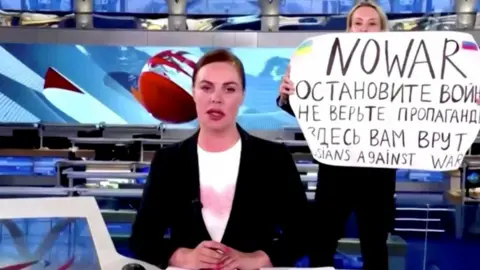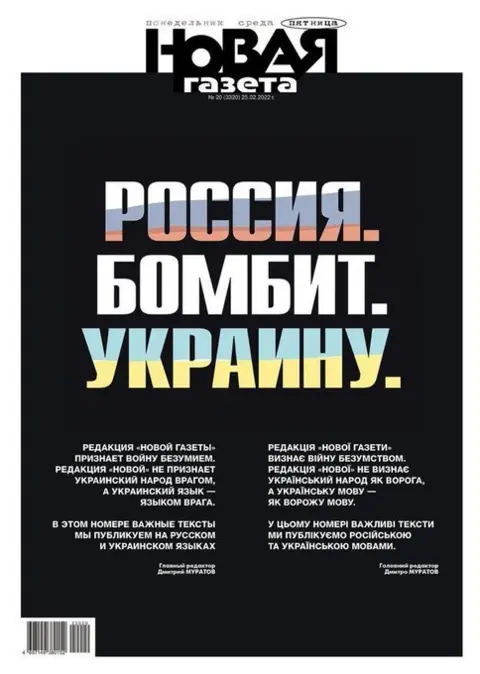Media in Russia: How do Russians get news about the war in Ukraine?
 Reuters
ReutersThe situation in Russia's media is unprecedented. Restrictions on reporting are increasingly severe, and access to almost all independent outlets is blocked or limited - or they censor themselves.
Despite this, it is still possible to obtain uncensored information in Russia.
For most Russians, television remains the main source of the news. It is firmly controlled by the Kremlin and pumps out relentless war propaganda. Ukrainians are said to shell their own cities, and Russian troops are presented as liberators.
The fact that the majority of Russians tune in to TV news means they are inclined to at least hear the Kremlin's message - and possibly believe it.
There is more variety of opinion in the press, but it still largely sticks to the Kremlin line. A stalwart of independent reporting for almost 29 years, the Novaya Gazeta newspaper, suspended operations on 28 March after receiving warnings from Russia's media watchdog Roskomnadzor.
 Novaya Gazeta
Novaya Gazeta
Online, most independent news websites are blocked or restricted, and so are Facebook, Instagram and Twitter.
But crucially, these blocks are relatively easy to bypass.
By now, anyone in Russia who is reasonably savvy with computers and smartphones will be familiar with tools such as virtual private networks (VPNs), which help to circumvent the restrictions.
They are not yet outlawed in Russia, and they are what millions of Russians are using to access uncensored information.

War in Ukraine: More coverage
- LIVE: Latest updates from Ukraine
- SURVIVAL: 'They won't tell me how many bullets were in me'
- SHOOTING: Does video show Ukrainian war crime?
- READ MORE: Full coverage of the crisis

Reporting on the war is another matter. In early March, Russia passed a law under which publishing "false information" about what the Russian army is doing is punishable by up to 15 years in jail.
In practice, this means punishment for reporting anything that challenges the Kremlin's narratives on its campaign in Ukraine. The media are even banned from calling it a "war": it is meant to be called a "special military operation".
As a result, some of the few remaining independent media in Russia have started to censor themselves.
For example, Novaya Gazeta blurred out the anti-war poster held up by a protester who interrupted a live news bulletin on Russian state TV.
Allow X content?
There are, however, Russian independent media who still defy government restrictions.
Among the most prominent outlets are the Meduza and Mediazona websites - both have been blocked in Russia and both are labelled as "foreign agents" by the Russian government.
"You will not silence us," Meduza said in a defiant statement. "We need independent media to stop the war and then try and improve life in Russia at least to a degree."
Both websites operate from abroad due to restrictions at home.
